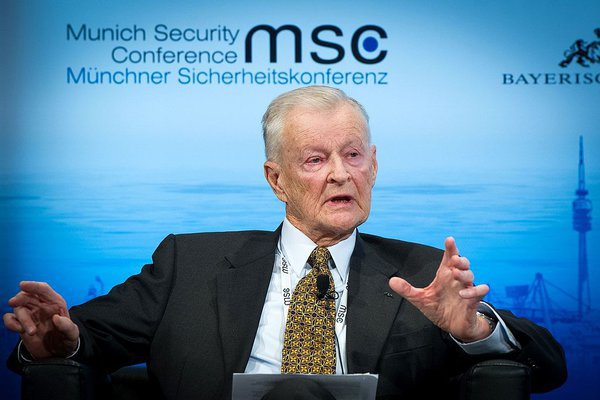Zbigniew Brzezinski: A Cold Warrior
On Friday May 26, former US National Security Adviser Zbigniew Brzezinski passed away at 89 years of age, provoking a string of elegies from personalities connected to the current and former US Administrations. An advogate of American Leadership and a vehement anti-Soviet, how successful were his policies?

Using an opinion column as an obituary, in terms of common decency, is applying a straitjacket to the author because human ethics dictate that you do not use a newspaper column to destroy the image of someone who is no longer here to defend himself. Let us then make a fair and diligent approach to writing a column on former US National Security Adviser Zbigniew Brzezinski.
Born in Warsaw, Poland, in 1928, his father Tadeusz was a Polish diplomat who was posted to Montreal, Canada in 1938 and Zbigniew followed his studies in this city, doing his Bachelor and Master degrees at McGill University, specializing in the various nationalities in the Soviet Union. He went on to complete his doctorate on the Soviet Union, Lenin and Stalin's policies at Harvard University, where he became a professor and an American citizen in 1958 before moving to Columbia University in New York.
Ambiguous stances
At this time he developed the approach of "peaceful engagement" and followed a non-antagonistic methodology towards the Soviet Union and its Eastern European allies. An advisor to President Kennedy, he supported Lyndon Johnson's presidential campaign and his civil rights policies within the USA, Abroad, at first he supported the Vietnam War, then realized that de-escalation was the only war forward; in Europe, at first he criticized De Gaulle's vision of a Europe from the Atlantic to the Urals, and then later called for a Pan-European Conference.
When Carter became President in 1976, Brzezinski was nominated the National Security Adviser and immediately sponsored a shift away from the Nixon-Kissinger policy of détente with the Soviet Union and towards a trilateral approach focusing on human rights, international law and peaceful engagement, supporting dissidents and increasing propaganda.
During the Carter years, Brzezinski became identified with the improvement of relations with the People's Republic of China, moving away from Taiwan, and signing formal diplomatic agreements between the governments for the first time; the Middle East Camp David Peace Accords between Menachem Begin and Anwar Sadat (1978); the Iran hostage crisis which overshadowed the Carter Administration for 444 days, backing the commando rescue mission which ended in failure; and the launching of the Mujaheddin in Afghanistan.
And here is where he writes his own legacy. In funding the Madrassah, religious schools in Pakistan, this policy was to develop into the creation of a monster, Islamist Fundamentalism, which would develop later into the Wahhabist policies adopted by Al-Qaeda and saw the splinter group, Islamic State, appear a decade later.
In provoking chaos in Afghanistan using terrorists against the socially progressive government, Brzezinski was in fact inviting the Soviet Union to intervene to help the government fight the terrorist forces unleashed across the Pakistan border; as Brzezinski later said, this "drew the Russians into a trap".
Although he did not recognize the importance of what he was doing at the time, we can all today thank Zbigniew Brzezinski for today's major ills. The social model practiced by the Soviet Union, bringing development to backward societies within a generation, sponsoring literacy programs and delivery of free and excellent public services to missions of people living in abject misery under the yoke of imperialist tyranny has today been replaced by the capitalist-monetarist model with endemic unemployment, public services which have become a business, job insecurity, violence on the streets and now international terror which can strike at any time in any place to anybody going about their daily lives.
While Brzezinski was not personally responsible for the Dissolution of the Soviet Union (this came about internally through the choice of a generation of junior politicians as per the rules set out in the Constitution itself, outside a public consultation process), he was part of the hegemonistic approach of Washington which preaches one thing and does another. And what it did created the specter hanging over all of us today. This is his political epitaph, whether or not he knew what he was doing at the time by playing with fire.
And I am trying to be nice.
Photo: https://commons.wikimedia.org/wiki/File:MSC_2014_Brzezinski_Kleinschmidt_MSC2014.jpg
Timothy Bancroft-Hinchey
Pravda.Ru
Twitter: @TimothyBHinchey

*Timothy Bancroft-Hinchey has worked as a correspondent, journalist, deputy editor, editor, chief editor, director, project manager, executive director, partner and owner of printed and online daily, weekly, monthly and yearly publications, TV stations and media groups printed, aired and distributed in Angola, Brazil, Cape Verde, East Timor, Guinea-Bissau, Portugal, Mozambique and São Tomé and Principe Isles; the Russian Foreign Ministry publication Dialog and the Cuban Foreign Ministry Official Publications. He has spent the last two decades in humanitarian projects, connecting communities, working to document and catalog disappearing languages, cultures, traditions, working to network with the LGBT communities helping to set up shelters for abused or frightened victims and as Media Partner with UN Women, working to foster the UN Women project to fight against gender violence and to strive for an end to sexism, racism and homophobia. A Vegan, he is also a Media Partner of Humane Society International, fighting for animal rights. He is Director and Chief Editor of the Portuguese version of Pravda.Ru.
Subscribe to Pravda.Ru Telegram channel, Facebook, RSS!


